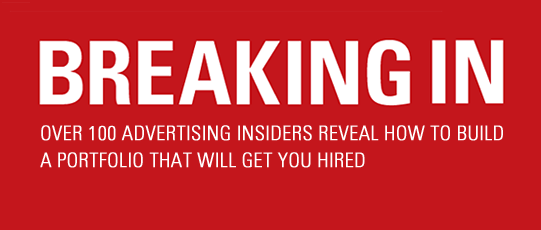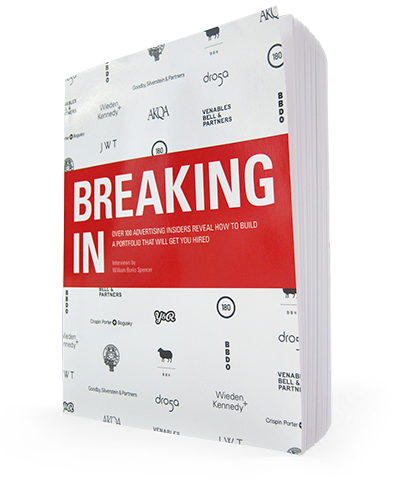In case you missed it, check out some great work from Michael Russoff.
[ … ]
WS: So do you look for evidence of their personality?
MR: Yes, and their heart. I want to be able to feel a person through a book. Like humanity. That’s the main thing I look for in a book is humanity, because I think if you’ve got that, and if that comes through for different brands in your work, then you’re going to touch people in some way. And then it’s interesting. Then you’ll connect with people. I’m not interested in arrogance or bravado. Or cleverness, even. I’d much rather see someone with a big heart in their book than a big brain. I think that means a lot more in a book.
WS: What do you think of sketches or scamps versus finished work for books?
MR: I actually prefer scamps. Somehow, if it’s very finished you’re sort of saying, “It’s finished” as a student. It’s like a full stop when you finish something really well. You’re kind of saying, “Here it is, judge me, it’s not changing.” Whereas if you have a scrap of paper, there’s more emotion, there’s more fluidity. It’s like, “This is just a stage. This is just a process. I know it’s not about this. This is just to show you.” It says more about the person—the attitude of the person doing it.
[ … ]
WS: What do you think about putting things in a book that aren’t ads at all? Just journal writing, or art, or things that show something about you?
MR: Yeah, I’d be happy if your whole book is that, actually. I wouldn’t mind. I’ve seen books like that. They’re very interesting. And I’ve seen people who have a book of advertising ideas and then a book of other stuff. And it’s usually the book of other stuff that tells you more about that person or their creativity. So definitely, yeah. If you’re a creative person you’ll be creative in lots of different ways.
WS: And so you’re looking for personality, and a different way of thinking, and a unique mind?
MR: Yeah. Someone who not only looks at things differently, but who can make other people look at things differently—because otherwise you’re on your own and you’re just an oddball. You might as well be sitting on a park bench with all your bags. You’ve got to be able to take people with you. To be able to make them see things differently as well. Then it’s powerful. Then it’s interesting.
WS: If you had to give a piece of advice to someone who’s just starting out, or just putting their book together, or trying to improve, what would it be?
MR: I think, remembering when I was taking a book around—I think it was a pretty crap book as well—it was such a roller coaster because you would go and see someone, and someone would like one campaign and they wouldn’t like another. And then you’d go and see someone else the same afternoon and they’d like exactly the campaign that the other person didn’t like. And they didn’t like the campaign that the other person did like. And I think finding a way of explaining that, or learning from it, is the most difficult part of the process of putting a book together and trying to get a job through a book. I think the thing it should teach you is to value your own judgment. That’s what it really is saying to you. It’s saying that all advertising is subjective. It’s got nothing to do with whether it’s good or bad because, at the end of the day, you’re going to show it to people, people out there are going to see it. They’re going to like it or not like it. That’s your book, really. So I think to be able to agree with some people and disagree with other people, and find your own balance within those two poles [is important]. You have to learn to make up your own mind about what good work is.
WS: So it’s developing a point of view on advertising, or on anything, that’s yours. Is that correct?
MR: Or just to know what work you want to do. What work you like. You might go to an agency and they like your work. I mean, that’s the best thing: is to be able to go somewhere that appreciates what you like. There’s no point in creating a book that doesn’t feel like it’s you, but you’re doing it because this is a great job, or you really like this creative director, or you like the office view, or whatever. You’ve got to find the work you like to do, and then you’ve got to find someone who appreciates that. And then I think there’ll be a flow between you and your first job. Because I think your first job is the most important. To get the right people around at the very beginning is the most important thing. And it’s worth waiting, I think, for that moment where you feel it’s really right…


Comments are closed.